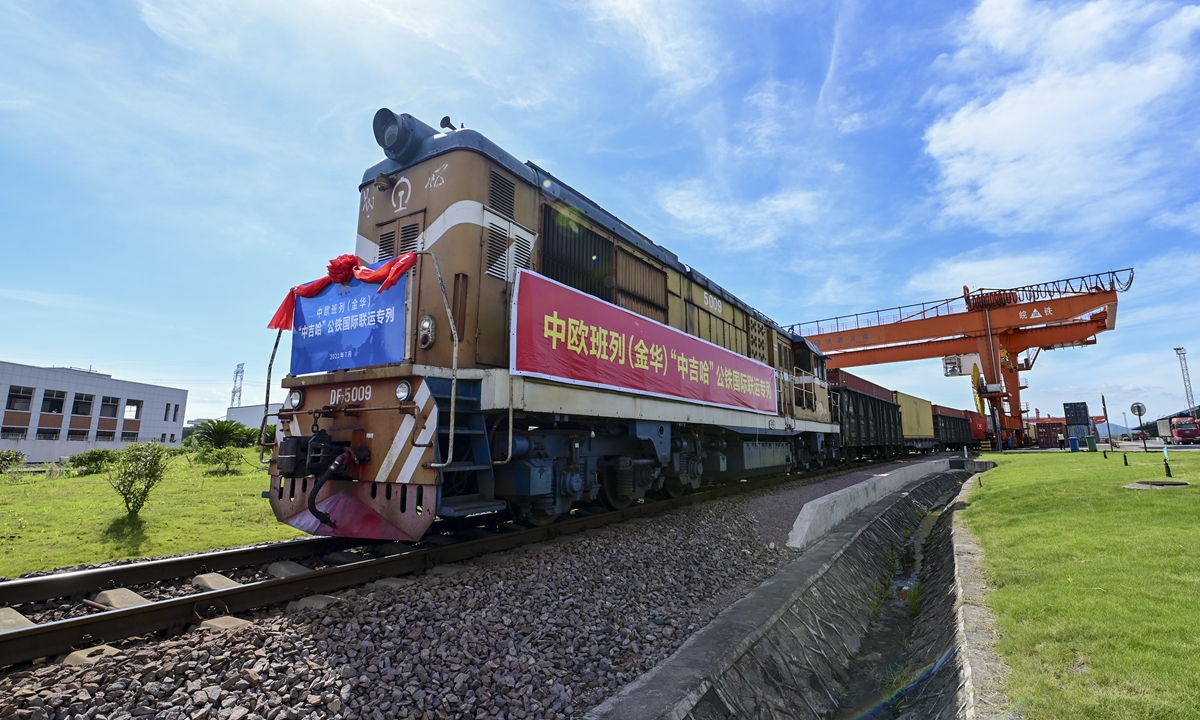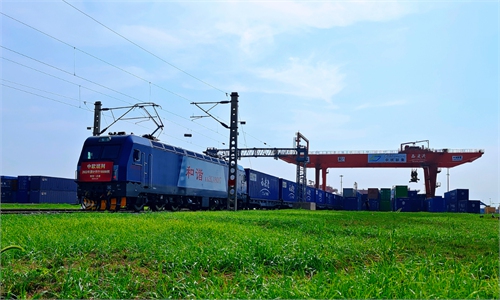
The China-Kyrgyzstan-Kazakhstan freight train departs Jinhua in East China's Zhejiang Province. Photo: VCG
Bans imposed by Russia and some European countries on trucking have not impacted road transport between China and the European continent, despite recent concerns over potential disruptions, Chinese traders and experts said on Monday.
Starting on Monday, Russia banned trucks from EU countries, Norway, Ukraine and the UK, in retaliation to restrictions imposed by these countries on Russian truckers, according to Russian news agency TASS. The ban will be valid until December 31. Some types of food, manufactured goods, ingredients and non-food items are exempt from the ban.
Several Chinese cross-border traders told the Global Times that they haven't seen any major impact on China-Europe road transport so far.
Zhang Sixin, general manager of Xinjiang Zhonghuan Logistics Co, said that shipments from China to Europe and the other way around is normal despite the new restrictions.
"News that had been circulating in the industry since September is finally confirmed. But the flow of goods, as far as we are concerned, remains the same. At the China-Kazakhstan border, daily clearance remains at 22 trailers per day. Outgoing shipments include batteries and other products," Zhang told the Global Times on Monday.
Zhang's company operates 3,000-strong truck convoys, which deliver goods across the Eurasia landmass from factory gate to factory gate.
Now that trucks from the EU cannot enter Russia, the transfer of goods will be done with the help of warehouses and trucks docking at the border to complete the transfer, Zhang added.
However, the restrictions are expected to increase logistics costs and times in matching European vehicles with Russian trucks, some traders said.
"It is expected to increase some costs," a trader who preferred not to be identified told the Global Times on Monday. "When trucks from certain countries are restricted, we will switch to other countries. We have trucks from Kazakhstan, Belarus and European countries."
The trader said that road transport costs more than railways and is mainly used to deliver goods that are needed quickly, such as groceries for Central Asia and Russia as well as e-commerce products sent to Europe.
The China-Europe railway has so far not been affected by the restrictions, traders said.
Tommy Tan, president of Shanghai EPU Supply Chain Management Co, an agent for China-EU freight trains, told Global Times on Monday that the closure of road borders to EU vehicles should have no relevance to the goods on the China-Europe freight train.
"As long as this ban does not extend to China-Europe freight trains, overall impact on freight transportation between China and Europe will not be significant," Chen Jia, an independent research fellow on international strategy, told the Global Times on Monday.
Chen said that on the one hand, lower transit efficiency may affect the orders of some Chinese cargo shipment enterprises, while on the other hand, it may indirectly stimulate and accelerate China-Russia trade.
"Due to the negative impact on EU exports to Russia, it will make Russia turn to Asia and China for foreign trade," Chen said.
Bilateral trade between China and Russia reached $117.2 billion from January to August this year, surging 31.4 percent year-on-year, as the two countries maintained normal cooperation despite Western sanctions.
China's imports from Russia came in at $72.95 billion for the period, up 50.7 percent, according to data from China's General Administration of Customs.
The International Road Transport Union (IRU), the world transport organization, said it is closely monitoring the situation when reached by the Global Times. The IRU said the impact of the ban needs more time to be ascertained. Meanwhile, the organization said it is working with relevant parties to explore alternative trade routes, such as the ones that cross the Caspian Sea and Uzbekistan.



